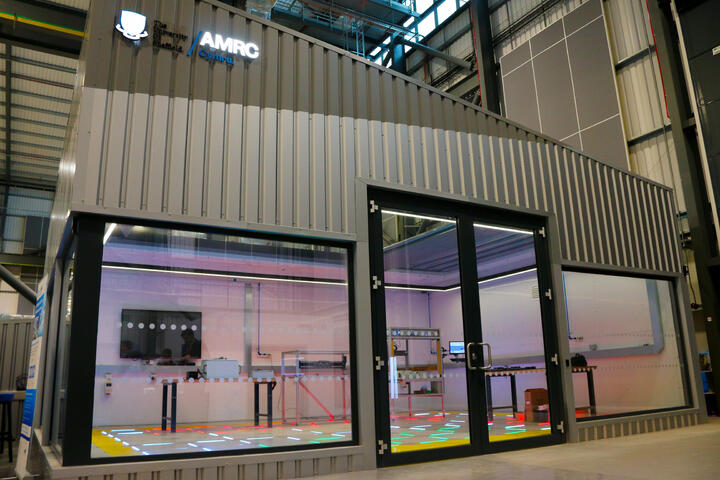Toyota on the road to ‘green’ future propulsion
24 April 2023Toyota Motor Manufacturing UK has signed a deal with AMRC Cymru to accelerate the decarbonisation and digitalisation of the transport sector by optimising hydrogen fuel cell assembly.
Article featured in the latest issue of the AMRC Journal.
Exciting, new advancements have been made to the Hydrogen Electric Propulsion Systems (HEPS) assembly testbed, based at the University of Sheffield Advanced Manufacturing Research Centre (AMRC) Cymru in North Wales, since work began in October 2022.
The HEPS project aims to de-risk the assembly and production scale up of hydrogen fuel cells for the automotive, aerospace and rail industries. The first iteration of the HEPS testbed consists of a reconfigurable floor, collaborative robots and other advanced Industry 4.0 technologies in a self-contained assembly area, making it ready for developing and de-risking innovative new methods of fuel cell assembly.
Building on a long-standing relationship, Toyota and the AMRC, part of the High value Manufacturing (HVM) Catapult, are collaborating on a 12-month project where Toyota will use the HEPS testbed to assemble its hydrogen fuel cells in the North Wales facility, focusing on enabling fuel cell manufacturing in the UK. The Toyota project is funded by the Welsh Government’s Low Carbon Automotive Transformation Fund.
Lee Wheeler, senior engineer and hydrogen/ future propulsion lead at AMRC Cymru, says that working with Toyota is an exciting opportunity for the AMRC. He said: “Toyota brings in the expertise around its manufacturing system and the fuel cell that’s currently used in its vehicles. The AMRC will play a pivotal role in the project by contributing our expertise in digital manufacturing, future propulsion, hydrogen, sustainable manufacturing and by providing the assembly testbed to perform the tests.”
Simon Foster, senior manager for production control and new business development at Toyota UK, said: “This is a brilliant opportunity to work with the AMRC Cymru, part of a network of world-leading research and innovation centres. This exciting project allows us to develop the concept / proof for assembly of fuel cell electric vehicle (FCEV) powertrains, significantly contributing to the skill base of Toyota and AMRC. The collaboration with the AMRC will challenge our way of thinking, allowing the development of new and innovative solutions.”
Since its inception, Toyota has been an active part of the industry steering board assembled by AMRC Cymru, which guides the work of the HEPS assembly testbed, to ensure the work being done is relevant to industry and addresses real-world manufacturing needs and challenges.
One of the recent developments in the project is the use of advanced gasket application equipment and an advanced visual metrology system to address an industrial challenge around fuel cell stack leakages. The visual metrology system stops leaks in the fuel cell by checking if the seals are applied correctly.
AMRC Cymru engineers have also worked on laser part-marking for fuel cell components. Lee explains: “Part-marking assigns a unique code to every component to help identify and track the components, providing a digital built record of the multiple components going into the fuel cell.
“Laser part-marking allows the system to stop the process if the wrong parts are used or are being inserted in the wrong way. It also enables in-process verification, allowing us to check if the right parts are being fixed in the fuel cell in the right way, assuring its in-built quality.”
Stuart Dawson, chief engineer for hydrogen at the AMRC, said: “We’re delighted that Toyota, one of the world leaders in hydrogen fuel cell technologies, has decided to collaborate with AMRC Cymru to exploit the capabilities of the new HEPS assembly cell.
“For the UK hydrogen fuel cell sector, in general, we have noticed a discontent between the high maturity levels of their product and the much lower ones for their manufacturing methods. That's why we invested over £1m into the new HEPS cell which will allow the UK manufacturers to develop high yield, high rate, globally competitive methods of fuel cell assembly. The HEPS cells will enable these companies to scale up their production and for fuel cell manufacturing to become anchored within the UK.
AMRC Cymru research director, Andy Silcox, said: “There is nothing like the HEPS testbed currently available in the HVM Catapult and we see it as a key capability for AMRC Cymru. There is real interest in this kind of reconfigurable assembly technology amongst businesses in Wales and the north of England.
“By combining the AMRC’s advanced manufacturing technology capability with Toyota’s world renowned LEAN manufacturing culture and methodology, we hope we can establish a benchmark for how hydrogen propulsion systems can be manufactured and pave the way for their widespread adoption as the green fuel solution for surface transport post 2030.”
The AMRC Cymru team will explore how to de-risk, industrialise and scale-up the assembly of hydrogen fuel cells and electrolysers by applying advanced manufacturing processes and the AMRC’s capabilities in automation, digital, in-process verification and design for manufacture.
Lee says that the HEPS assembly testbed ultimately aims to manufacture and assemble fuel cell/ electric powertrains in a low cost, standardised and sustainable way in a boost to the UK transport sector, helping it to get closer to its Net Zero ambition.
He added: “Hydrogen electric propulsion systems are a new area for the AMRC. We’re stepping into the unknown, it’s not been done before by the AMRC but we're learning and leading the way for the HVM Catapult.”
AMRC Cymru is a £20m cutting-edge R&D facility that opened in 2019 to provide an open innovation Centre for manufacturers in Wales. Backed by the Welsh Government, AMRC Cymru is the first HVM Catapult centre in Wales.
The High Value Manufacturing (HVM) Catapult, of which the AMRC is one of six centres across the UK, has funded the HEPS project which is specifically targeting seven industries: aerospace, energy generation, heavy automotive, off highway, public transport and rail.

